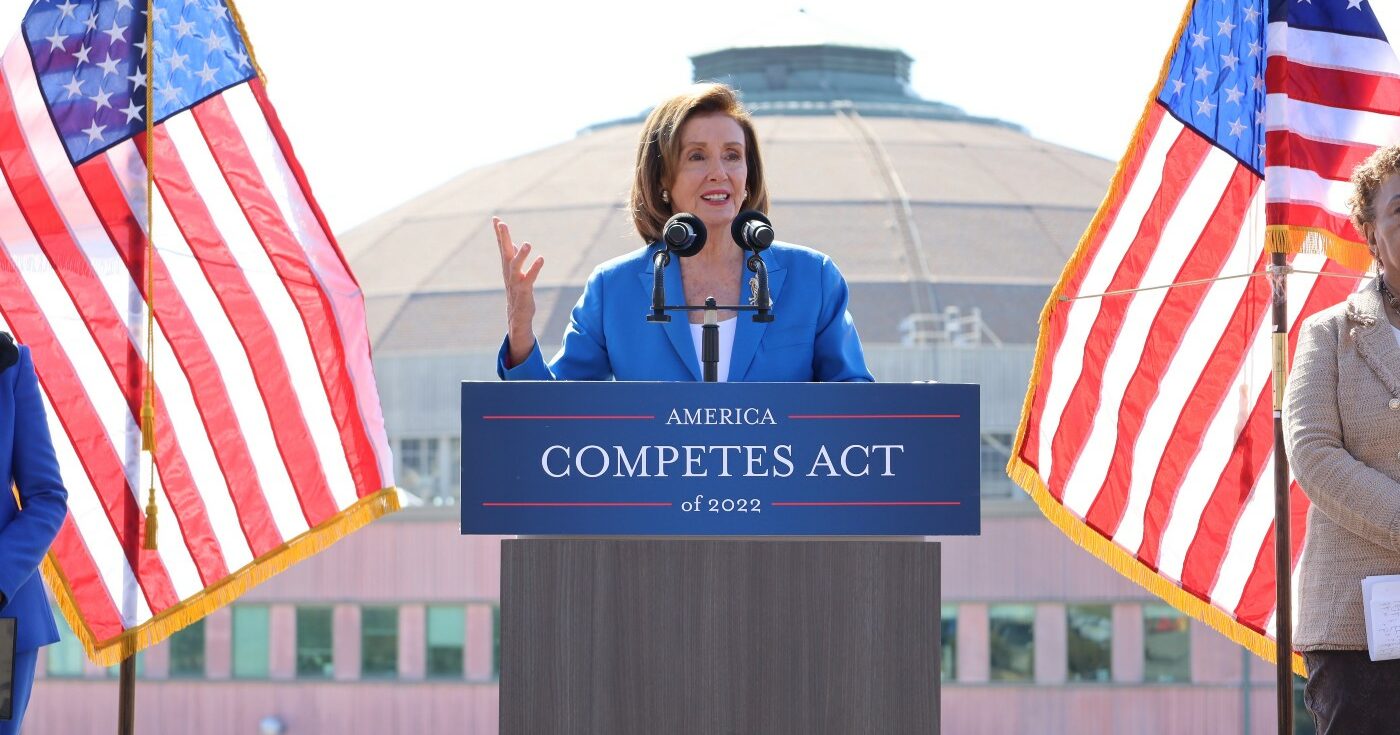By Sam Sanders
For months, Congress has been developing a massive legislative package aimed at bolstering the U.S.’s economic competitiveness with China. In the Senate, this bill is known as the United States Innovation and Competition Act, or “USICA.” The House version of the legislation, the America COMPETES Act (or the “COMPETES Act” for short), passed the House this spring. The package is now in conference between the House and Senate to hammer out the differences between the two chambers’ versions and to reach a final bill.
There’s one little-noticed provision on the table in the COMPETES Act, the House version of the bill, that could significantly impact Amazon’s exploitative business model.
The America COMPETES act includes a provision from Rep. Earl Blumenauer (D-OR) to bar the use of the “de minimis” waiver to products from certain countries. “De minimis” is a phrase meaning “about minimal things” – in other words, “too small to be important” for a specific rule. De minimis exemptions in the law allow for situations that are widely considered to be relatively insignificant, in the grand scheme of things, to fall through the cracks of a particular law or regulation.
The de minimis loophole up for debate in the COMPETES Act conference is specifically related to laws about which countries get to take advantage of importing products into the U.S. without the usual fees and restrictions. Companies like Amazon, selling massive amounts of low-cost products coming from China, benefit enormously from this exemption: they basically get to ship imported goods en masse into the U.S. tax-free.
The idea behind the original de minimis exemption is: if an imported item has a relatively low value, it’s not as necessary for the package to go through onerous Customs and Border Protection processes to enter the country. In addition, items that fit into the de minimis loophole are not subject to duties – basically, the import taxes, sales taxes, or other taxes that otherwise have to paid on products imported from other countries.
Think of the gift shops you may have seen in an international airport terminal – “duty-free” stores let you pick up that candy bar or bottle of perfume without any of the duties, or taxes, of the country where the airport is located. However, that’s a perk that you, as a typical tourist looking to save on a cheap souvenir, might genuinely need or appreciate. Amazon, which only paid a measly 6 percent federal income tax rate on its billions of dollars of US-based income in 2021, hardly needs the discount. And one estimate shows that the value of goods entering the U.S. this way could be as high as $128 billion last year.
The de minimis threshold for imported goods used to be much lower, but it was raised to $800 in 2016, as part of a regulatory change included in the Trade Facilitation and Trade Enforcement Agreement Act of 2015. This was a quadruple increase from the previous threshold, when it was set at just $200 in the ‘90s – and is currently the highest such threshold in the world.
Since then, the increased de minimis threshold has contributed to a huge boom for online retailers shipping cheap goods into the U.S., and for the companies manufacturing those cheap goods. It’s especially been a boon for online retailers and e-commerce platforms – like Amazon, Wayfair, or Alibaba – that rely heavily on third-party sellers of goods manufactured at extremely low cost outside the U.S. Supporters of maintaining the exemption have claimed that closing the loophole would harm small businesses and independent sellers abroad. However, it’s these bigger corporations that really benefit from the de minimis exemption, because they have the capacity to manage networks of internationally-based, third-party sellers.
Basically, e-commerce platforms like Amazon realized that as long as they broke packages up into smaller and smaller units; the individual products being shipped were incredibly cheap; and the individual Amazon customer purchasing the product “counts” as the importer, rather than the company, then they can actually fit a lot of goods in under that $800-per-item limit, tax- and duty-free. Bypassing the customs process for imports also exposes US consumers to more counterfeit and potentially unsafe products.
Jeff Ferry, Chief Economist of the group Coalition for a Prosperous America (CPA), a bipartisan advocacy group representing the interests of domestic U.S. business, consumers, and labor, explained to MPU that Amazon “pioneered” a model that takes advantage of de minimis. Amazon ships products from China to wait in warehouses just outside the U.S., waits until a customer in the U.S. orders a specific product, and then imports that product directly to that individual consumer, tariff-free. The structure of the exemption now means that more and more retailers are incentivized to copy this business model.
Because of a lack of required corporate disclosure and transparency around these shipments, it’s difficult to estimate exactly how much of Amazon’s multibillion-dollar revenue comes from their de minimis imports, or what the share they generate of the millions of de minimis waiver packages per day. However, we do know, according to a Marketplace Pulse analysis highlighted by CPA, that a whopping 63 percent, nearly two-thirds, of new sellers on Amazon’s platform in 2021 were based in China, and that in 2020, Chinese products represented 39 percent of Amazon’s U.S. sales.
And the amount of goods now entering the U.S. under de minimis waivers is anything but minimal.
In 2021, U.S. Customs and Border Protection estimated 771.5 million packages entered the U.S. under the de minimis loophole, or 2 million packages a day. U.S. Customs data reviewed by the Wall Street Journal showed an estimate nearly $67 billion worth of de minimis imports in 2020. Research from the Coalition for a Prosperous America, taking into account not only Customs data but also Census data on e-commerce and reports from private e-commerce companies, shows that the value of annual de minimis shipments could be much higher than U.S. Customs’ estimate for 2021: as much as $128 billion, and could represent between $10-20 billion of lost tariff revenue on imports. If CPA’s estimate of de minimis imports was included in the official U.S. trade deficit measurements, the trade deficit would have been 15 percent higher than reported last year.
The language now in the COMPETES Act would close this loophole to goods imported from countries that are determined by the office of the U.S. Trade Representative (USTR) to be “non-market-based economies,” or countries where the USTR has determined that a country is setting an artificially low price for its exports; and that are on the agency’s Intellectual Property watchlist. It would also bar the use of the loophole to other countries that have certain fair trade actions against them, and require more oversight and inspection of the goods being imported. In particular, this is aimed at goods shipped from China, a country which falls into all of the named categories for additional scrutiny.
Why does this matter for U.S. workers and consumers?
For consumers, the de minimis waiver means there is very little to no oversight of the inexpensive products you order online. Counterfeit goods aren’t just a risk because they might not give you an authentic brand name – they can expose consumers to toxic materials like lead in cheap clothing or baby supplies, prescription drugs without the advertised active ingredients, or tech products with unsafe electrical components. The food, drug, and consumer safety regulations that we take for granted on other products don’t apply to goods imported under this exemption. 2020 testimony from consumer and government accountability watchdog group Public Citizen pointed out that counterfeit and unsafe imports seized by Customs & Border Protection have included products ranging from defective and unsafe airbags to weapons components.
But it’s not just about inspecting goods – the loophole staying as-is poses a continued threat to good jobs, and gives a huge economic advantage to companies like Amazon that rely heavily on third-party sellers abroad.
Many trade experts have argued that the de minimis loophole is partially responsible for ballooning the U.S. trade deficit with China. A trade deficit is the difference between the cost of the goods that a country imports, and the value of the goods it exports. When the U.S. has a negative trade deficit with another country, that means it’s paying more to import goods than it is benefiting from the economic value of exports that are sold to other countries. The overall U.S. trade deficit just hit a record high in March 2022. In 2021, the U.S. trade deficit in goods with China, on balance of the year, grew to $355 billion. Trade deficits can represent lost jobs for workers at home. One study from researchers at the Economic Policy Institute estimates that the U.S. trade deficit with China cost the U.S. 3.7 million jobs, mostly in manufacturing, between 2001 and 2018. Those jobs – and the jobs that supported once-thriving manufacturing communities – tend to be higher-paying, union jobs, while the jobs that replaced them are not. In part, this is because trade policy has incentivized a corporate race to the bottom around the globe, giving a market advantage to goods produced with cheap labor and unsustainable practices – often, those produced abroad in countries like China with even lower labor standards than the U.S., taking advantage of a lower-wage international workforce and lax labor, consumer, and environmental protections.
Amazon is not the only online retailer that has built a business model off of selling and shipping cheaply made goods from China, but they are certainly among the largest. Corporate interest groups like the U.S. Chamber of Commerce and the National Retail Federation are opposed to any tightening of the de minimis loopholes, claiming it will harm small businesses and independent foreign sellers. However, the lack of transparency and oversight of goods shipped in under de minimis means we have limited data about the value of the goods, what’s contained in them, and how much money giant online retailers like Amazon, fast fashion brands like Shein, or home goods retailers like Wayfair are actually making off of them.
The bipartisan conference committee charged with working out the final legislation includes 26 Senators and 81 Representatives of both parties. Senate Republican Leader Mitch McConnell has said he wants to see major concessions from House Democrats to bring the final bill closer in line with the Senate bill, USICA, which would leave the de minimis provision intact, and includes more corporate giveaways than the House bill.
But this isn’t just a partisan issue – the corporate influence of the import lobby crosses party boundaries. According to lobbying disclosures, Amazon spent $150,000 of its massive Q1 of 2022 lobbying budget to retain two at least two influential Democratic lobbyists with close ties to the Biden administration, Jeff Richetti and Steve Elmendorf, to lobby on the COMPETES Act, USICA, and other legislation that would impact Amazon’s bottom line. Narrowing this loophole would remove a significant but little-known tax advantage that Amazon enjoys. All eyes should be on Senate Republicans – and Democratic leadership – to ensure that this provision of the COMPETES Act makes it through to the final bill.



